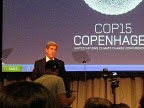 The Wednesday Copenhagen Special: Ban Ki-Moon plus some John Kerry, add a dash of Evo Morales, stir in the environmental ministers of Peru and Ecuador, don’t forget the secret ingredient of Lord Nicholas Stern, and serve with a side of the mayors of Seattle, Mexico City, Copenhagen, Melbourne, Johannesburg, and Bonn.
The Wednesday Copenhagen Special: Ban Ki-Moon plus some John Kerry, add a dash of Evo Morales, stir in the environmental ministers of Peru and Ecuador, don’t forget the secret ingredient of Lord Nicholas Stern, and serve with a side of the mayors of Seattle, Mexico City, Copenhagen, Melbourne, Johannesburg, and Bonn.
Delicious.
I have never been surrounded (engulfed, I might say) by so many important people in one place at one time. Indeed, this cop has brought together not only prominent heads of state, but the also most articulate experts of almost every environmental-related field. The list of players will soon shine as high-powered players like Obama and Hilary Clinton join the negotiations on Friday. A common thread of urgency ran through the speeches of all the prestigious individuals I saw today. John Kerry announced that amateur hour was over, and it was time for scientific fact to trump scientific future, calling upon Thomas Friedman’s Cheney principle to undermine skeptic’s refusal to act: if Dick Cheney can cite a 1% chance of nuclear weapons as grounds for military action, we have the same right, if not duty, to use a similar precautionary principle when confronting such a potentially “high-impact” issue, even if some believe it is “low-probability.”
At the ICLEI (Local Governments for Sustainability) talk, seven mayors from seven of the world’s most important cities discussed why they chose to make important environmental improvements to their city. Some, including Seattle, even committed themselves to the goals of the Kyoto Protocol and have reached them as a city. The message was clear: the mayors would not wait for heads of state to get their act together. Regardless of Friday’s final decision, these cities would continue to provide a clean, efficient, safe, low-CO2 environment for their citizens. The facilitator at the ICLEI talk commented that in the grand halls of the Bella Center, leaders could not agree on anything. Yet in their side event, the mayor of Dehli, Daar es Salam, Seattle, and Melbourne all stood in solidarity with the same concerns and aspirations.
Likewise, the Peruvian and Ecuadorian governments decided that they could not wait for the REDD decision, and instead have created national mechanisms to protect forests, and provide direct payouts and training that benefit their indigenous peoples. Ecuador has partnered with the German government is a program called SocioBosque, which they hope will be quite successful.
Across the board, the message was clear: we need to act now, and we will do all we can in our power to make the difference we can. Yet where was this sense of urgency in plenary talks? Why then, was the US awarded the Fossil of the Day award yesterday for sabotaging a draft for REDD – increasingly the most important and potentially substantive agreements to come from the cop? Deadlock seems to be the word of the week.
As hilariously ridiculous as Hugo Chávez’s speech was yesterday, one of his comments stuck with me: “If the climate were a bank, we would have bailed it out by now.” As recent events have demonstrated, the environment and the market – two systems presumed to be perpetually self-regulating – can break down. UN members have two more days to decide how, and if, they will save our ecosystsem. If the 130 heads of state reflect the urgency and cooperation I saw today in lower-level leaders, our children have nothing to fear.
Side note: I finally got the answer to question I posed in my last post. Because of the large-scale “Storming of the Bella Center” that occurred yesterday, the UN is permitting very limited numbers of NGOs into the negotiations for the rest of the week. The women in charge said the UN did not even want any at all after what happened yesterday, citing heightened security concerns as prominent heads of state start to roll in Thursday. I’m a little angry. My heart is with the Climate Justice Action protesters – I believe we need a fundamental system change and a deeper commitment to this problem than is being negotiated. But their efforts have been self-defeating: the security risks they created have stripped NGOs the privilege of accessing the center – and we are the entities most aligned with their cause and many of our organizations have potential to sway decision-makers. The voices on the outside now have very limited representation inside.


Interesting point about protestors actions preventing NGOs from doing what they most hoped to achieve in influencing the talks inside the Bella Center; it is truly unfortunate that their efforts were, in the end self-defeating. I do hope some communication and way of influence remains!